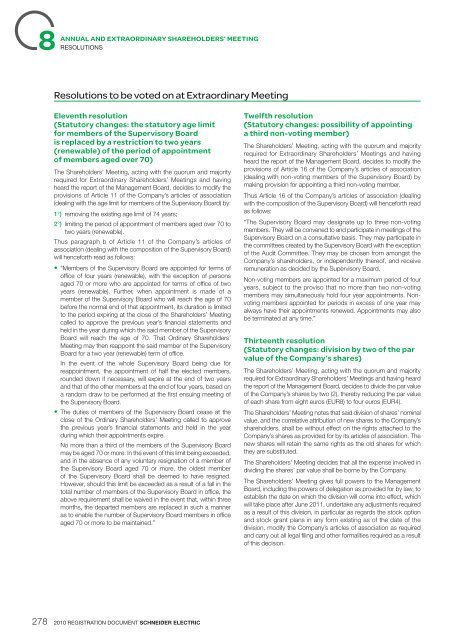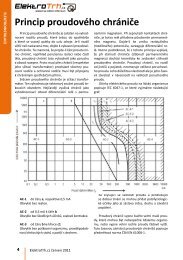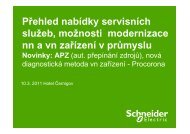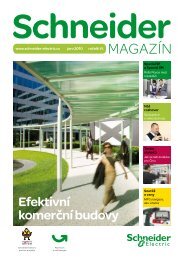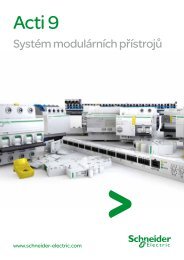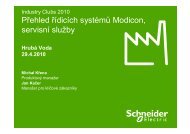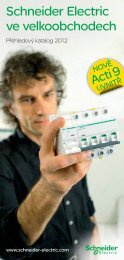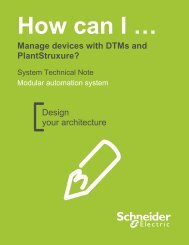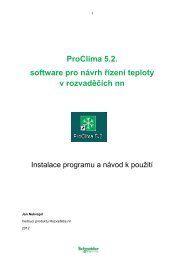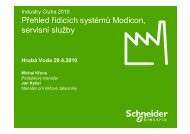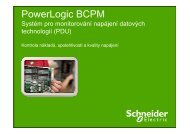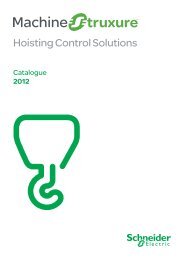2010Annual Report - Schneider Electric CZ, s.r.o.
2010Annual Report - Schneider Electric CZ, s.r.o.
2010Annual Report - Schneider Electric CZ, s.r.o.
You also want an ePaper? Increase the reach of your titles
YUMPU automatically turns print PDFs into web optimized ePapers that Google loves.
ANNUAL AND EXTRAORDINARY SHAREHOLDERS’ MEETING<br />
8 RESOLUTIONS<br />
278<br />
Resolutions to be voted on at Extraordinary Meeting<br />
Eleventh resolution<br />
(Statutory changes: the statutory age limit<br />
for members of the Supervisory Board<br />
is replaced by a restriction to two years<br />
(renewable) of the period of appointment<br />
of members aged over 70)<br />
The Shareholders’ Meeting, acting with the quorum and majority<br />
required for Extraordinary Shareholders’ Meetings and having<br />
heard the report of the Management Board, decides to modify the<br />
provisions of Article 11 of the Company’s articles of association<br />
(dealing with the age limit for members of the Supervisory Board) by:<br />
1°) removing the existing age limit of 74 years;<br />
2°) limiting the period of appointment of members aged over 70 to<br />
two years (renewable).<br />
Thus paragraph b of Article 11 of the Company’s articles of<br />
association (dealing with the composition of the Supervisory Board)<br />
will henceforth read as follows:<br />
• “Members of the Supervisory Board are appointed for terms of<br />
offi ce of four years (renewable), with the exception of persons<br />
aged 70 or more who are appointed for terms of offi ce of two<br />
years (renewable). Further, when appointment is made of a<br />
member of the Supervisory Board who will reach the age of 70<br />
before the normal end of that appointment, its duration is limited<br />
to the period expiring at the close of the Shareholders’ Meeting<br />
called to approve the previous year’s fi nancial statements and<br />
held in the year during which the said member of the Supervisory<br />
Board will reach the age of 70. That Ordinary Shareholders’<br />
Meeting may then reappoint the said member of the Supervisory<br />
Board for a two year (renewable) term of offi ce.<br />
In the event of the whole Supervisory Board being due for<br />
reappointment, the appointment of half the elected members,<br />
rounded down if necessary, will expire at the end of two years<br />
and that of the other members at the end of four years, based on<br />
a random draw to be performed at the fi rst ensuing meeting of<br />
the Supervisory Board.<br />
• The duties of members of the Supervisory Board cease at the<br />
close of the Ordinary Shareholders’ Meeting called to approve<br />
the previous year’s fi nancial statements and held in the year<br />
during which their appointments expire.<br />
No more than a third of the members of the Supervisory Board<br />
may be aged 70 or more. In the event of this limit being exceeded,<br />
and in the absence of any voluntary resignation of a member of<br />
the Supervisory Board aged 70 or more, the oldest member<br />
of the Supervisory Board shall be deemed to have resigned.<br />
However, should this limit be exceeded as a result of a fall in the<br />
total number of members of the Supervisory Board in offi ce, the<br />
above requirement shall be waived in the event that, within three<br />
months, the departed members are replaced in such a manner<br />
as to enable the number of Supervisory Board members in offi ce<br />
aged 70 or more to be maintained.”<br />
2010 REGISTRATION DOCUMENT SCHNEIDER ELECTRIC<br />
Twelfth resolution<br />
(Statutory changes: possibility of appointing<br />
a third non-voting member)<br />
The Shareholders’ Meeting, acting with the quorum and majority<br />
required for Extraordinary Shareholders’ Meetings and having<br />
heard the report of the Management Board, decides to modify the<br />
provisions of Article 16 of the Company’s articles of association<br />
(dealing with non-voting members of the Supervisory Board) by<br />
making provision for appointing a third non-voting member.<br />
Thus Article 16 of the Company’s articles of association (dealing<br />
with the composition of the Supervisory Board) will henceforth read<br />
as follows:<br />
“The Supervisory Board may designate up to three non-voting<br />
members. They will be convened to and participate in meetings of the<br />
Supervisory Board on a consultative basis. They may participate in<br />
the committees created by the Supervisory Board with the exception<br />
of the Audit Committee. They may be chosen from amongst the<br />
Company’s shareholders, or independently thereof, and receive<br />
remuneration as decided by the Supervisory Board.<br />
Non-voting members are appointed for a maximum period of four<br />
years, subject to the proviso that no more than two non-voting<br />
members may simultaneously hold four year appointments. Nonvoting<br />
members appointed for periods in excess of one year may<br />
always have their appointments renewed. Appointments may also<br />
be terminated at any time.”<br />
Thirteenth resolution<br />
(Statutory changes: division by two of the par<br />
value of the Company’s shares)<br />
The Shareholders’ Meeting, acting with the quorum and majority<br />
required for Extraordinary Shareholders’ Meetings and having heard<br />
the report of the Management Board, decides to divide the par value<br />
of the Company’s shares by two (2), thereby reducing the par value<br />
of each share from eight euros (EUR8) to four euros (EUR4).<br />
The Shareholders’ Meeting notes that said division of shares’ nominal<br />
value, and the correlative attribution of new shares to the Company’s<br />
shareholders, shall be without effect on the rights attached to the<br />
Company’s shares as provided for by its articles of association. The<br />
new shares will retain the same rights as the old shares for which<br />
they are substituted.<br />
The Shareholders’ Meeting decides that all the expense involved in<br />
dividing the shares’ par value shall be borne by the Company.<br />
The Shareholders’ Meeting gives full powers to the Management<br />
Board, including the powers of delegation as provided for by law, to<br />
establish the date on which the division will come into effect, which<br />
will take place after June 2011, undertake any adjustments required<br />
as a result of this division, in particular as regards the stock option<br />
and stock grant plans in any form existing as of the date of the<br />
division, modify the Company’s articles of association as required<br />
and carry out all legal fi ling and other formalities required as a result<br />
of this decision.


